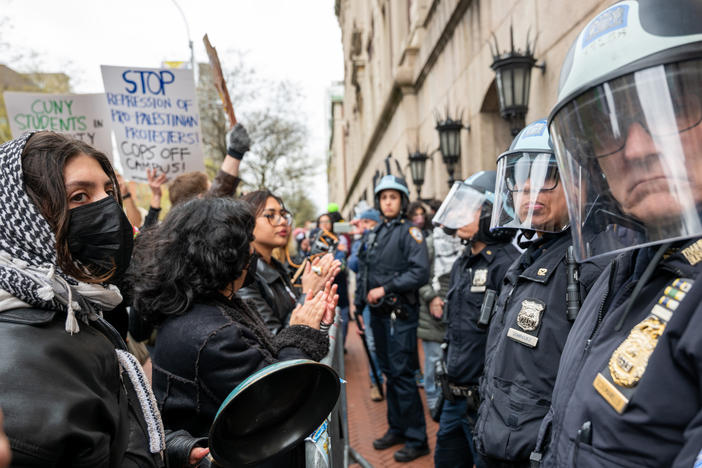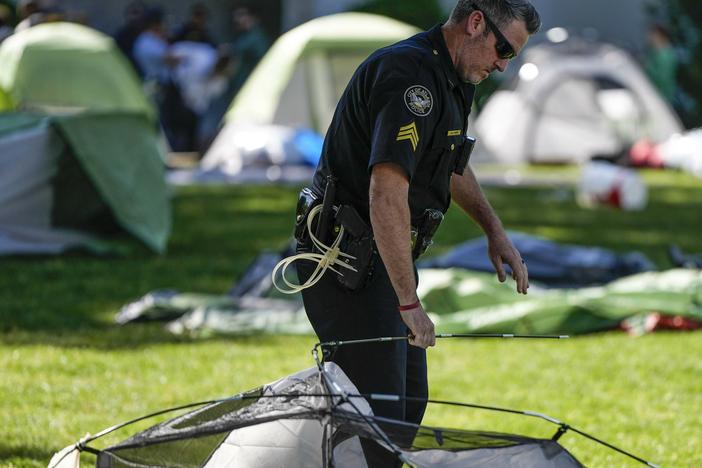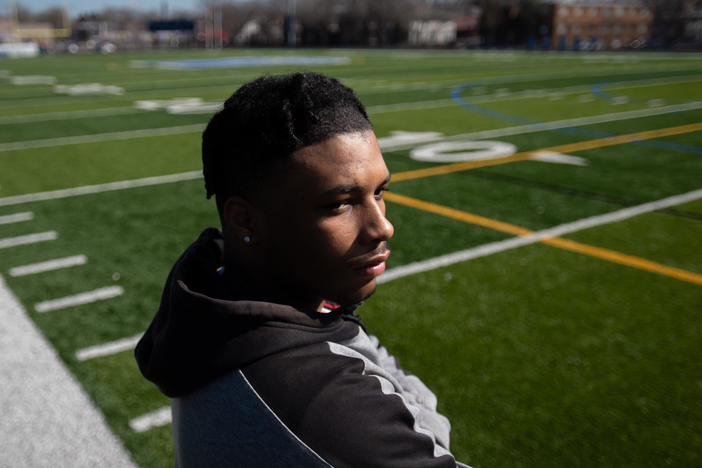Section Branding
Header Content
Morning news brief
Primary Content
A Hamas leader is killed in an explosion in Beirut. Harvard University President Claudine Gay resigns. Jury selection has begun in a civil trial in New York that could transform the NRA.
Transcript
LEILA FADEL, HOST:
A senior Hamas leader and six other members of its armed wing were killed in an explosion in Lebanon.
A MARTÍNEZ, HOST:
Lebanon blames Israel, which has not claimed responsibility for the attack. It's the first such killing after Israel vowed to target Hamas officials in other countries after the militant Palestinian group's October 7 attack on Israel. And Lebanese leaders have warned that the assassination could open another front in the war on Gaza.
FADEL: NPR's Jane Arraf joins us now to discuss this from Amman, Jordan. Hi, Jane.
JANE ARRAF, BYLINE: Hi, Leila.
FADEL: So what do we know about what happened in Lebanon?
ARRAF: Well, according to the Lebanese government, an Israeli drone targeted an office building in a southern suburb of Beirut Tuesday. Hamas announced the explosion killed Saleh al-Arouri. He's deputy - he was deputy head of its political bureau and one of the founders of the organization's military wing. And that's significant because it's one thing to target Hamas leaders in Gaza, where war between Hamas and Israel has been raging for three months, but it's another to launch attacks in the capital of another country. Israel and Hezbollah, that Iran-backed Lebanese militia, have been attacking each other across the Lebanese border since the start of the war in Gaza. But so far, they've stayed within a fairly limited zone around that border.
FADEL: Yeah. I mean, you mention this is really different to attack in a capital of another country. How have officials in Lebanon reacted to these killings?
ARRAF: Well, there's a lot of worry. Lebanon's prime minister, Najib Mikati, has said the attack is aimed at opening a new phase in the conflict at the Lebanese border. And he's asking the U.N. Security Council to condemn the breach of Lebanese sovereignty. We have to note that Israel hasn't claimed responsibility for the attack, as you mentioned.
FADEL: OK.
ARRAF: Mark Regev, an adviser to Israeli Prime Minister Benjamin Netanyahu, said in an MSNBC interview that whoever did it was not targeting Lebanon or Hezbollah.
But the big danger is that Hezbollah will likely feel compelled to respond in some way. And if it does escalate, Iran, which backs Hezbollah, could get involved. Hezbollah leader Hassan Nasrallah has said in the past that any assassinations in Lebanon will incur retaliation. And he's giving a speech this evening in Lebanon. That speech, to commemorate the U.S. killing of Iranian General Qassem Soleimani in Baghdad four years ago, happens on an already tense anniversary. But that might give us some picture of what's ahead.
FADEL: OK. What more do we know about the senior Hamas leader, Arouri?
ARRAF: Well, he was 57 years old, a sheikh who studied Islamic jurisprudence in the West Bank. He spent years in Israeli jail. And he became one of the founders of the military wing of Hamas, which was established after the Palestinian uprising in 1987 against Israeli occupation. He was deported in Turkey. And in Lebanon, importantly, he was the main liaison with Hezbollah and is credited with building relations with Iran, a Shia Muslim country, while Hamas is Sunni Muslim. He was also involved in negotiations in Doha over a cease-fire in Gaza and the release of Israeli hostages, which could complicate things.
FADEL: And very quickly - I mean, we talked a lot about Lebanon, but what's been the reaction among Palestinians to this killing?
ARRAF: Lots of demonstrations in the West Bank and general strikes in several West Bank cities to protest. But the day is still young, and that killing really does raise tensions around the region.
FADEL: NPR's Jane Arraf talking to us from Amman, Jordan. Thank you so much, Jane.
ARRAF: Thank you.
(SOUNDBITE OF MUSIC)
FADEL: The search is on for a new president of Harvard University.
MARTÍNEZ: Yeah. Six months after she took the job, Claudine Gay, Harvard's first Black president, resigned yesterday. She's been taking a lot of heat for her comments to a congressional committee about antisemitism on campus and accusations of plagiarism in her past academic work.
FADEL: NPR's Tovia Smith has been following the story, and she joins us now. Hi, Tovia.
TOVIA SMITH, BYLINE: Hi there.
FADEL: So what was it that pushed Gay to resign all these weeks later after the congressional hearing?
SMITH: Well, it seems it was these multiple allegations of plagiarism that ultimately brought her down. There was, of course, fierce backlash to her testimony last month after she said that calls for genocide against Jews would not necessarily violate campus rules. But at that point, Harvard still had her back.
Things really seem to have changed this week, when we learned of even more allegations that she lifted chunks of language without attribution. In her resignation statement, Gay said it was difficult beyond words to have doubt cast on not only her commitment to confronting hate, but also now on her scholarly rigor. And she said she's resigning so as not to be a distraction.
FADEL: Now, I know this is happening during Harvard's winter break, and so there's not really anyone on campus. What kind of reaction are you hearing?
SMITH: Well, it's split. There are those who've been calling for Gay's resignation all along who say they're thrilled now that she's finally gone. That includes a Harvard grad student I spoke to named Shabbos Kestenbaum.
SHABBOS KESTENBAUM: Whether it was her disastrous congressional testimony, whether it was her inability to enforce policies about antisemitism on campus, or whether it was creating a hostile culture at Harvard where people don't feel that they have the ability to exchange ideologies that are not in favor at the moment, it was just time and time again she did the wrong thing.
SMITH: And I'll add that many people who've called for Gay's ouster have said that Harvard's problem is not a single person, but a culture. And that was also echoed by Elise Stefanik, the congresswoman who grilled Gay and the presidents of Penn and MIT at that hearing. Stefanik said in a statement that her investigations would continue into what she called a woke agenda and political bias at Harvard and at other campuses.
FADEL: OK, so how much do those comments from Stefanik about Harvard actually point to a bigger, broader political battle here?
SMITH: Very much. As one faculty member I spoke to put it, this is not about Harvard; it's about New Hampshire and Iowa. Or as another put it, the committee is using the pretext of fighting antisemitism to actually fight DEI, or diversity, equity and inclusion, as well as to fight how schools approach things like race and gender.
I spoke with Harvard professor Khalil Gibran Muhammad, who called Gay's resignation a terrible moment for higher ed.
KHALIL GIBRAN MUHAMMAD: That is the witch hunt that is unfolding right now, where the argument has now been extended in Claudine Gay as the first Black woman as a diversity hire who is supposedly unqualified as proof that Harvard had lowered its standards and was being ruined from within. And that is not going to stop at Harvard.
SMITH: Gay herself noted in her statement that she's faced personal attacks, quote, "fueled by racial animus," and Harvard's board also cited racist vitriol directed at her.
FADEL: So now that Gay is out, what happens next? Who leads Harvard, the battle over what speech is protected on campus?
SMITH: Yeah, Gay stays at Harvard as a tenured faculty member and an interim president takes her job until a permanent one is found. But no, don't expect her resignation to be the end of it, either in terms of the tussle over what's taught on college campuses or on where to draw the line between protected speech and hate speech on campus.
FADEL: NPR's Tovia Smith. Thanks, Tovia.
SMITH: Thank you.
(SOUNDBITE OF MUSIC)
FADEL: Jury selection began yesterday in a civil trial in New York that could transform the National Rifle Association, the nation's largest gun rights group.
MARTÍNEZ: Yeah. New York Attorney General Letitia James is hoping to oust longtime NRA leader Wayne LaPierre on corruption charges. He's denied any wrongdoing. Three other current and former NRA leaders are also named in the suit.
FADEL: NPR's Brian Mann is covering this and joins us now. Hi, Brian.
BRIAN MANN, BYLINE: Hey. Good morning.
FADEL: Good morning. So what are the accusations Wayne LaPierre is facing?
MANN: You know, the NRA was once one of the biggest political forces in Washington and in state capitals around the country. The organization really succeeded for decades under LaPierre's leadership, pushing the gun control debate to the right, blocking gun control measures even after catastrophic mass shootings like Sandy Hook and Parkland.
But beginning in 2019, the organization began to unravel with internal feuds and accusations of corruption. New York's attorney general, Letitia James, began investigating, and her team says they found evidence that more than $64 million in cash from NRA donors was misused by LaPierre and other leaders. The lawsuit claims the organization became a personal piggy bank, paying for things like private jet flights to the Bahamas. This is a civil lawsuit, so there's no risk of jail time or criminal penalties for LaPierre or the three others named in the suit. But if the NRA loses this case, LaPierre could be ousted after more than 30 years at the helm, and New York officials would also gain a lot more regulatory oversight over the NRA's activities.
FADEL: What do LaPierre and the NRA say about these claims?
MANN: From the outset, they've argued that this is an attempt to silence and weaken a conservative pro-gun group. Basically, they say it's a political attack by a Democratic attorney general. The NRA tried repeatedly to have this case dismissed on those grounds, but their arguments have been rejected by appeals court, so now we're going to trial.
It is important to note that this case and the growing controversy surrounding LaPierre have already really crippled the NRA. Since the lawsuit was filed in 2020, they've lost millions of members. The NRA shut down their juggernaut media operation, even attempted once to file for bankruptcy. And LaPierre, who's 74 years old now, you know, he used to be a really high-profile player in American politics, courted by presidents. And his personal influence has clearly waned because of all of this.
FADEL: OK. So it seems like the NRA is back on its heels here, facing serious legal peril. How has that affected the wider debate over gun rights and gun safety?
MANN: Yeah, this is interesting. Before the NRA was hit by internal dissent and these legal troubles, a lot of their beliefs about gun regulations had really been adopted wholesale by the Republican Party and by many of the GOP's core voters. So while the NRA's direct influence has faded, we haven't seen big changes to the politics of gun control despite the growing number of mass shootings in America, daily gun violence in some cities and also polls showing broad public support for things like universal background checks. The GOP has largely stuck to their argument that almost all gun regulations violate the Second Amendment. So the NRA is a shadow of itself as this case goes to trial. But the NRA's ideas, they're still incredibly influential.
FADEL: NPR's Brian Mann. Thanks for your reporting, Brian.
MANN: Thank you. Transcript provided by NPR, Copyright NPR.
Bottom Content



